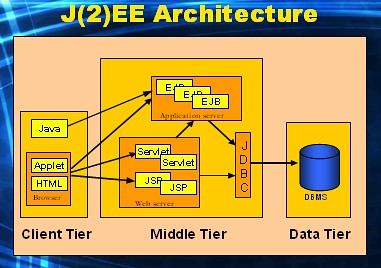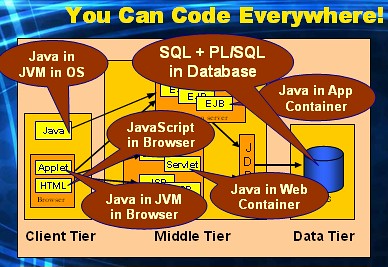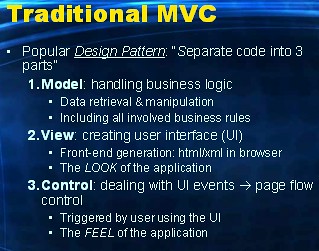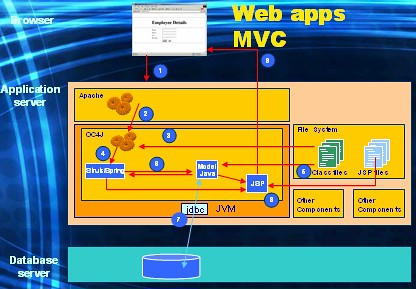After presenting the four historical observations (see previous four blog posts), I now proceed in giving my "layman's understanding" of this beast called "JEE".
The(?) JEE Architecture
Here's a way to look at JEE.

In this architecture we discern three (some say four) "tiers".
- The data tier
- The middle tier (which holds two "containers")
- The client tier
The JEE architecture allows us to write code everywhere:
- Inside the web container we develop servlets and (old fashioned) JSP's using Java.
- Inside the application container we develop the EJB's in their various sorts, also with Java.
- Inside the browser we use Javascript to increase the user experience of the application.
- Inside the JVM of the browser we develop rich internet applications with Java.
- Inside the JVM offered by the client operating system we can do the same.
- And of course, allthough the JEE architecture does not mention this in any way whatsoever: at the data tier we can write code inside the x-VM of the DBMS. In the case of Oracle this would be the pl/sql-VM.

There are many ways you can use JEE to develop a database web application. It all depends on where you want to write the "application logic" for your application. I will return to exactly this particular subject in-depth in upcoming posts.
A very popular design pattern in the JEE world is the Model-View-Control design pattern. Commonly referred to as just MVC. Whenever the end user triggers some event inside the user interface (UI) typically the application code needs to perform something. Code that investigates the event and determines what to do next is called Control code. More often than not, the application will have to query and/or transact data at this time. Code that performs this is called Model code. And finally the UI needs to be refreshed/modified: this is done by View code. The MVC design pattern dictates that these three types of code are not to be merged in one another, but specifically coded into separate modules that communicate with eachother.

Note the "traditional" adverb in the title above. Of course it's not traditional ... , yet! This is a mainstream design pattern used in almost every JEE project. However I believe it should be traditional at some point in time in the near future :-).
To clarify in more detail what the MVC design pattern is about I show my audience two animations. The first one animates how a pre-MVC built web application would handle a browser request.

The browser sends a request to the webserver (due to some event triggered by the end user).
- Apache accepts the request and,
- Forwards it to the web server container.
- The web container loads a class file from the filesystem
- The web container instantiates an object from this class file, and invokes a method on the object.
- The method then performs all relevant application logic, including,
- rendering the html for the next web page that is to be displayed inside the browser of the end user.

The same scenario described above now goes as follows.
- Browser sends a request.
- Apache forwards the request to the web container.
- The web container loads a Control class.
- And instantiates a Control object.
- The control object investigates the request, and might decide that some querying and/or transacting needs to be done. However it does not perform this, instead it,
- Loads a Model class, instantiates an object from it, and invokes a method on the object.
- This method then performs all necessary model logic and communicates the result back to the control object.
- The control object then determines what the next page of the application should be and loads/instantiates/invokes a view class (eg. a JSP) to perform so.
- The JSP might communicate with the model object to retrieve some cached data that needs to be embedded in the html output stream that it sends back to the browser.
In the next post I will discuss seven (2 power 3 minus 1) alternative ways to use the MVC design pattern. To be continued...
Ecorptrainings.com provides J2EE in hyderabad with best faculties on real time projects. We give the best online trainingamong the J2EE in Hyderabad. Classroom Training in Hyderabad India
ReplyDeleteI have read your blog its very attractive and impressive. I like it your blog.
DeleteJava Training in Chennai Core Java Training in Chennai Core Java Training in Chennai
Java Online Training Java Online Training JavaEE Training in Chennai Java EE Training in Chennai
For Free IT Study Materials,IT Certification Materials,Interview Questions and Job references.
ReplyDeletesappractices@gmail.com
For All SAP Modules.
Testing Tools
Bigdata Technologies
Oracle Technologies
IBM Technologies
BI Tools
Thanks
nice information.... Thank you
ReplyDeleteNice tutorial. Thank you for sharing with us.
DeleteJava Training in Chennai | Java Course in Chennai
Some of them were feeling very difficult to learn programming language. Once they are familiar with programming language they decided to learn the language in a simple way. Start to learn Java courses at FITA. They are providing a wonderful training with best MNC experts.
ReplyDeleteRegards,
Java Courses in Chennai | J2EE Training in Chennai | JAVA Training in Chennai
Thank You for sharing your article. I like it. It is great information about J2EE. We provides TIBCO Online Training in Hyderabad.
ReplyDeleteThat really great information....keep me informed.
ReplyDeletelearn j2ee online
Excellent post!!! The future of .net application development is on positive note. It offers huge career prospects for talented professionals all over the world. Training on .net technology will ensure good salary package. Best DOT NET Training in Chennai | .NET Course in Chennai
ReplyDeleteThanks for providing the best information it's very useful sap basis learners.
ReplyDeleteSAP BASIS Course in Hyderabad
Online SAP BASIS Training in USA
In near future, big data handling and processing is going to the future of IT industry. Thus taking Hadoop Training in Chennai | Big Data Training in Chennai will prove beneficial for talented professionals.
ReplyDeletearticle is so convincing that I never stop myself to say something about it. Wow this blog is very nice.............
ReplyDeleteR12 SCM Online Training
This article is too good.good in formative.thanks for sharing such a
ReplyDeletevaluble blog.oracle fusion procurement online training
Nice Post
ReplyDeleteLinux Training in Chennai
Red Hat Linux Training in Chennai
Red Hat Training in Chennai
ERPTREE handles oracle fusion HCM training and its modules maintaining classroom based training with the self-paced videos. An expert having ten plus years of self-experience handles the training period through online and explains each and every point perfectly. We recently launched our institute in the USA and getting
ReplyDeletethe best reputation over there.
Oracle fusion HCM Online Training
Oracle Fusion HCM Training
Nice post!! Thanks for sharing this information and keep updating us.
ReplyDeleteOracle BI Obiee Training Institute in Delhi
MySQL Training in Delhi
Oracle Apps Training Institute in Delhi
This article is very much helpful and i hope this will be an useful information for the needed one. Keep on updating these kinds of informative things...
ReplyDeleteFitness SMS
Fitness Text
Salon SMS
Salon Text
Investor Relation SMS
Investor Relation Text
Mobile Marketing Services
mobile marketing companies
Sms API
article is so convincing that I never stop myself to say something about it. Wow this blog is very nice
ReplyDeleteAttend free demo classes at igofusion for Oracle Fusion Online Financials coaching
Such a great articles in my carrier, It's wonderful commands like easiest understand words of knowledge in information's.
ReplyDeleteCore Java Online Training Hyderabad
Thanks for sharing informative article… Know about How to Change BSNL WiFi Password from techfizy.
ReplyDeleteWow, this blog is very nice I really like your blog and Impressive thank you very much for posting this blog...................Get more information about Oracle Fusion Financials Course details at our Erptree website
ReplyDeleteI have to voice my passion for your kindness giving support to those people that should have guidance on this important matter.
ReplyDeleteBest Java Training Institute in chennai
Appreciation for really being thoughtful and also for deciding on certain marvelous guides most people really want to be aware of.
ReplyDeleterpa training in chennai
Ciitnoida provides Core and java training institute in
ReplyDeletenoida. We have a team of experienced Java professionals who help our students learn Java with the help of Live Base Projects. The object-
oriented, java training in noida , class-based build
of Java has made it one of most popular programming languages and the demand of professionals with certification in Advance Java training is at an
all-time high not just in India but foreign countries too.
By helping our students understand the fundamentals and Advance concepts of Java, we prepare them for a successful programming career. With over 13
years of sound experience, we have successfully trained hundreds of students in Noida and have been able to turn ourselves into an institute for best
Java training in Noida.
java training institute in noida
java training in noida
Really awesome blog. Your blog gives very useful information. Thanks for sharing. Top Java training in Hyderabad.
ReplyDeleteGreat Post!!! I have read your blog and it's very informative & really impressed .
ReplyDeleteThanks for sharing it. Keep continue your post.
Best SAP online Training Institute in India
SAP HANA online Training
SAP S/4 HANA training online
SAP UI5 Online Training in India
SAP FICO TRAINING ONLINE
Thank you for sharing this Blog, It includes very well information.
ReplyDeleteiphone job Oriented course
Mobile App Training Institutes
Really awesome blog. Your blog is really useful for me.
ReplyDeleteclick here:Oracle Fusion Financials Training in Hyderabad
This is an awesome post.Really very informative and creative contents.This concept is a good way to enhance the knowledge.
ReplyDeleteJava training in Chennai
nice blog.
ReplyDeleteClick here for more :
Oracle Fusion Financials Training in Hyderabad
After I read and try to understand this article in conclusion amazingwe are generally grateful for the nearness of this article can incorporate impressively more learning for each one of us. thankful to you.
ReplyDeleteAccountants Brighton
I've been surfing on the web over 3 hours today, yet I never found any fascinating article like yours. It's enough worth for me. As I would see it, if all web proprietors and bloggers made exceptional substance as you did, the net will be basically more productive than at whatever point in late memory.
ReplyDeleteBrighton Accountants
I am really enjoying reading your well written articles. It looks like you spend a lot of effort and time on your blog. I have bookmarked it and I am looking forward to reading new articles. Keep up the good work.
ReplyDeleteOracle Fusion HCM Training in Hyderabad
ReplyDeleteBest Solidworks training institute in noida
SolidWorks is a solid modeling computer-aided design (CAD) and computer-aided engineering (CAE) computer program that runs on Microsoft Windows. SolidWorks is published by Dassault Systems. Solid Works: well, it is purely a product to design machines. But, of course, there are other applications, like aerospace, automobile, consumer products, etc. Much user friendly than the former one, in terms of modeling, editing designs, creating mechanisms, etc.
Solid Works is a Middle level, Main stream software with focus on Product development & this software is aimed at Small scale & Middle level Companies whose interest is to have a reasonably priced CAD system which can support their product development needs and at the same time helps them get their product market faster.
Company Address:
WEBTRACKKER TECHNOLOGY (P) LTD.
C-67,Sector-63,Noida,India.
E-mail: info@webtracker.com
Phone No: 0120-4330760 ,+91-880-282-0025
webtrackker.com/solidworks-training-Course-institute-in-noida-delhi
Great post! I am actually getting ready to across this information, It’s very helpful for this blog.Also great with all of the valuable information you have Keep up the good work you are doing well.
ReplyDeleteData science training in velachery
Data science training in kalyan nagar
Data Science training in OMR
Data Science training in anna nagar
Data Science training in chennai
Data Science training in marathahalli
Data Science training in BTM layout
Data Science training in rajaji nagar
It is amazing and wonderful to visit your site.Thanks for sharing this information,this is useful to me...
ReplyDeleteDevops training in velachry
Devops training in OMR
Deops training in annanagar
Devops training in chennai
Devops training in marathahalli
Devops training in rajajinagar
Devops training in BTM Layout
Good article, Thanks for sharing info on The Helsinki Declaration (IT-version). Node.JS training in india
ReplyDeleteWow it is really wonderful and awesome thus it is very much useful for me to understand many concepts and helped me a lot. it is really explainable very well and i got more information from your blog.
ReplyDeleteData Science Training in Chennai
Data science training in bangalore
Data science online training
Data science training in pune
Data science training in kalyan nagar
ReplyDeleteNice blog..! I really loved reading through this article. Thanks for sharing such a amazing post with us and keep blogging...
Informatica online training in Hyderabad
Informatica training in Hyderabad
Best Informatica online training in Hyderabad
Have you been thinking about the power sources and the tiles whom use blocks I wanted to thank you for this great read!! I definitely enjoyed every little bit of it and I have you bookmarked to check out the new stuff you post
ReplyDeletejava training in chennai | java training in bangalore
java training in tambaram | java training in velachery
java training in omr
It's interesting that many of the bloggers to helped clarify a few things for me as well as giving.Most of ideas can be nice content.The people to give them a good shake to get your point and across the command
ReplyDeletejava training in annanagar | java training in chennai
java training in marathahalli | java training in btm layout
java training in rajaji nagar | java training in jayanagar
java training in chennai
This comment has been removed by the author.
ReplyDeleteI was very pleased to find this site.I want to thank you for this great content!! I enjoyed every little bit of it and I have you bookmarked to check out new stuff you post.
ReplyDeleteFrench Training Institute in Chennai
Best French Training in Chennai
French Training Centers in Chennai
french courses in chennai
french language course in chennai
spoken french classes in chennai
best french classes in chennai
french coaching classes in chennai
I just want to say that all the information you have given here is awesome. Thank you
ReplyDeletejava certification training in chennai
struts training in chennai
best java training
Java training in T Nagar
Java training in Velachery
Java training in Adyar
Java training in Tambaram
ReplyDeleteNice blog..! I really loved reading through this article. Thanks for sharing such a amazing post with us and keep blogging...
Hadoop training in Hyderabad
Hadoop online training in india
Bigdata Hadoop online training in usa
ReplyDeleteThis idea is a decent method to upgrade the knowledge.thanks for sharing.
Hadoop online training in Hyderabad
Hadoop training in UK
Bigdata Hadoop training in USA
Greetings. I know this is somewhat off-topic, but I was wondering if you knew where I could get a captcha plugin for my comment form? I’m using the same blog platform like yours, and I’m having difficulty finding one? Thanks a lot.
ReplyDeleteAmazon Web Services Training in Tambaram, Chennai|Best AWS Training in Tambaram, Chennai
Amazon Online Training
AWS Training in JayaNagar | Amazon Web Services Training in jayaNagar
AWS Training in Rajaji Nagar | Amazon Web Services Training in Rajaji Nagar
Amazon Web Services Training in Pune | Best AWS Training in Pune
AWS Online Training | Online AWS Certification Course - Gangboard